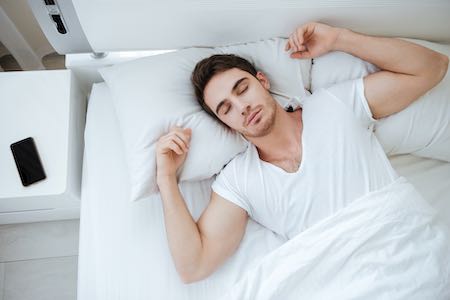Snoring can make for a rough night’s sleep, for you and your fellow bed-mate. But if it happens because you have obstructive sleep apnea (OSA) then there may be a bigger problem than you think.
What is Obstructive Sleep Apnea?
Obstructive Sleep Apnea or OSA occurs when there is partial or complete blockage of the upper airway during sleep. This can lead to shallow or maybe even no breathing, for a period during sleep. Due to the obstruction, the diaphragm and chest muscles must work harder to open the obstructed airway so some air can get to the lungs. This can lead to an array of disruptive sleeping habits like jerking, snorting, or gasping.
Health Risks of OSA
There are many health risks that are associated with OSA. Besides the negative effect that reducing the flow of oxygen to your organs can have, here are a variety of other health effects.
1. Hypertension (High Blood Pressure)
If you already have hypertension, sleep apnea can make it worse. When you wake up often during the night, your body gets stressed. That makes your hormone systems go into overdrive, which boosts your blood pressure levels. Also, the level of oxygen in your blood drops when you can’t breathe well, which may add to the problem.
2. Heart Disease
People with OSA are more likely to have heart attacks (myocardial infarction). The causes may be low oxygen and possibly the stress of waking up often. Strokes (cerebrovascular accident) and atrial fibrillation — a fast, fluttering heartbeat — are also linked with the issue.
Sleep apnea disrupts how your body takes in oxygen, which makes it hard for your brain to control how blood flows in your arteries and the brain itself.
3. Type 2 Diabetes Mellitus (DM2)
Sleep apnea is common among people with this condition — 80% or more of them may have OSA. Obesity raises a person’s risk for both disorders. Although studies haven’t shown a cause-and-effect link between sleep apnea and type 2 diabetes, not getting enough shut-eye can keep your body from using insulin properly, which leads to diabetes. Studies with sleep deprivation also show a high correlation with DM2.
4. Weight Gain
Extra pounds raise your chances of getting sleep apnea, and the condition also makes it harder to slim down. When you’re overweight, you can have fatty deposits in your neck that block breathing at night. On the flip side, sleep apnea can make your body release more of the hormone ghrelin, which makes you crave sweets and junk food. And when you’re tired all the time, you might not be able to turn the food you eat into energy as efficiently, which can lead to weight gain.
The good news? Treatment for OSA can make you feel better, with more energy for exercise and other activities. This can help you lose weight, which can help your sleep apnea.
5. Adult Asthma
Science hasn’t shown a link to OSA, but people who get sleep apnea treatment may find they have fewer asthma attacks.
6. Acid Reflux
There’s no proof that sleep apnea causes this kind of heartburn, but anecdotal feedback show it’s a problem. Treating it seems to improve apnea symptoms for some people.
7. Car Accidents
When you feel groggy, you raise your risk of falling asleep at the wheel. People with sleep apnea are up to five times more likely than normal/healthy sleepers to have traffic accidents.
Tips To Improve OSA
There are several strategies that you can use to improve your symptoms of OSA. While surgery is an option, there are also nonsurgical options as well.
- Reduce hypnotic sleep drugs (Ambien, Lunesta, etc.)
- Reduce alcohol intake prior to bed, and in general.
- Proper sleep hygiene – going to bed at the same time every night, winding down, blue light blocking glasses in the evening, do not eat too late.
- Do not use caffeine throughout the day as that can disturb circadian rhythm, sleep cycles.
- Lose weight. Sleep apnea worsens with weight. And the body will crave sugar and junk food with sleep deprivation and low oxygen in the brain.
- Wear a wearable that tracks sleep quality.

Conclusion
Obstructive sleep apnea poses a greater threat than many of us think. If you or your partner is suffering from Obstructive Sleep Apnea it is time to take charge of your health take the appropriate steps to fixing the problem. Your health and your bed-mate will thank you!


